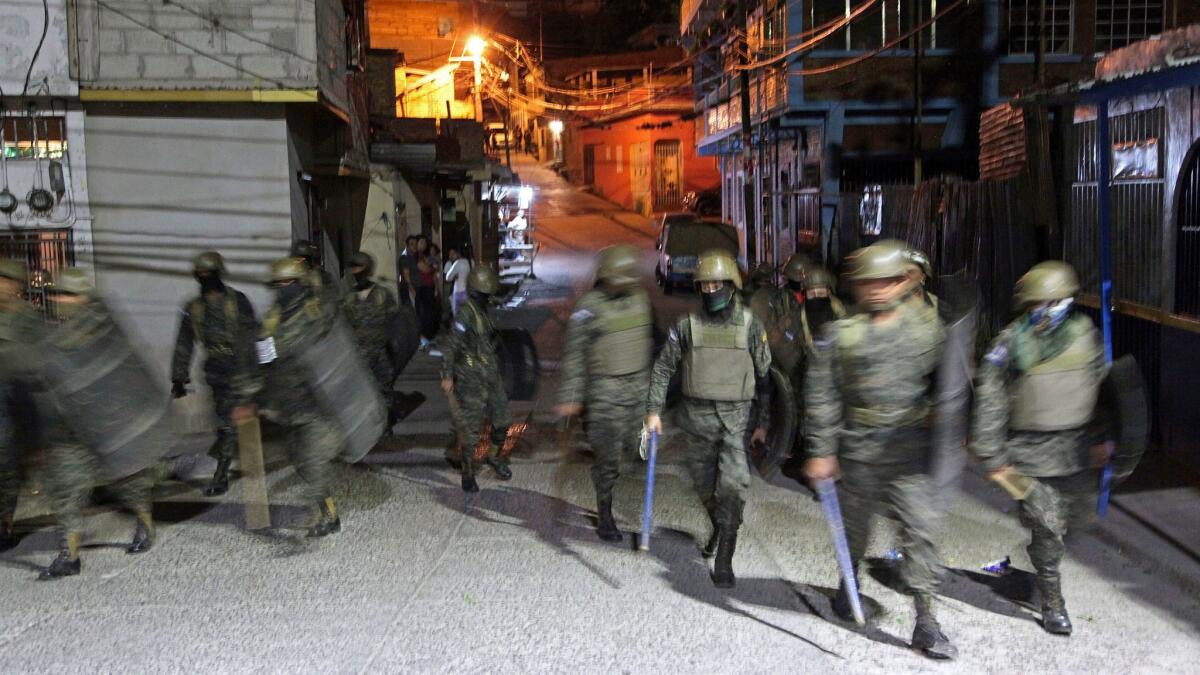Op-Ed: Honduran democracy is under assault

- Share via
Latin America hasn’t had the kind of “color revolutions” that swept across Eastern Europe and the Middle East in the 2000s. But Honduras’ recent descent into authoritarianism may have created the conditions for one.
The country’s democracy is under assault.
While serving as head of the Honduran Congress in 2012, Juan Orlando Hernandez orchestrated the sacking of four out of five Supreme Court justices and their replacement with partisan allies. Soon afterward, Hernandez was elected president.
Hernandez’s government is among the most authoritarian in the hemisphere. Its human rights record is deplorable. Dozens of journalists and human rights activists, including the indigenous rights activist Berta Caceres, have been killed — almost always with impunity.
President Hernandez has undermined Honduras’ already fragile democratic institutions. The Honduran Constitution strictly bans presidential reelection. But in 2015, Hernandez’s packed Supreme Court ruled, outlandishly, that the term limits enshrined in the constitution were “inapplicable” to him, thus paving the way for his illegal reelection bid last month.
Although most Hondurans disapproved of his reelection, a second term for Hernandez appeared inevitable, thanks to the ruling National Party’s abuse of public resources and the fact that the opposition was divided between the center-right Liberal Party and the center-left Opposition Alliance.
But the Opposition Alliance’s candidate, Salvador Nasralla, a former sportscaster, pulled off an electoral surprise on Nov. 26. With nearly 60% of the votes counted, Nasralla led by almost five percentage points. One of the magistrates on the Supreme Electoral Tribunal, or TSE, called his lead “irreversible.” The third-place candidate, Luis Zelaya of the Liberal Party, publicly recognized Nasralla’s victory.
Recently, U.S. support for democracy has waned.
Then the TSE went silent for more than 24 hours. And after a mysterious “computer glitch,” updated results showed Hernandez ahead. This dubious shift triggered accusations of fraud, not only from the Opposition Alliance but also from the Liberal Party and reputable media outlets, including the Economist. The Organization of American States criticized the election’s “irregularities, errors and systematic problems” and called for a recount.
Hernandez’s government responded by imposing a curfew and repressing protesters. According to Amnesty International, at least 14 people, including a teenage girl, have been killed during post-election protests. More than 800 people have been arrested.
The disputed election has united diverse opposition groups and sparked a protest movement calling for a full and transparent recount. Adopting nonviolent tactics used by color revolution protesters in Serbia, Ukraine and Tunisia, Honduran youth have led thousands in peaceful rallies and held candlelight vigils to signal their dissent.
Students have distributed white flowers to soldiers and police, some of whom have refused to obey government orders to repress protesters. Orchids, Honduras’ national flower, are being drawn on walls throughout the nation’s capital, Tegucigalpa.
The stage appears to be set for an “Orchid Revolution.”
But the movement needs help. The international community must press the Honduran government to agree to a full and transparent recount — and, if it becomes necessary, to a new election.
Pressure from the United States is particularly important. Although the U.S. often tolerated and even supported coups in Latin America during the Cold War, it became a stronger proponent of democracy in the region in the 1990s. In 1993, the U.S. helped Guatemalans force President Jorge Serrano from office after he closed Congress. In 1994, after Dominican President Joaquin Balaguer rigged an election, the U.S. successfully pressured Balaguer to hold new elections and retire. That same year, American troops restored a democratically elected president to power in Haiti. And U.S. diplomats helped block a military coup in Paraguay in 1996, and another in Ecuador in 2000.
Though hardly spotless, the U.S.’s record of promoting democracy in the Americas was, on balance, positive in the post-Cold War era. This helped to make the last quarter-century the most democratic in Latin American history.
Recently, however, U.S. support for democracy has waned. This change has accelerated under Donald Trump, the first American president in decades to openly embrace autocrats.
The Trump administration has been silent about Hernandez’s abuses, including last month’s election irregularities. Because U.S. officials view the right-wing Hernandez as an ally, they seem willing to give him a pass on democracy and human rights. Indeed, just after the election, Secretary of State Rex Tillerson certified that Honduras has been combating corruption and protecting human rights — two congressional requirements for U.S. assistance under the Alliance for Prosperity initiative. This appears to have emboldened Hernandez.
The consequences of American inaction extend far beyond Honduras. When the U.S. embraces autocrats and tolerates stolen elections, it sends a clear signal across the region: Democracy can be subverted without serious international repercussions. As in the dark days of the Cold War, aspiring autocrats will know that as long as they remain friendly with the U.S., they can trample on democracy and human rights with impunity.
We cannot return to the Cold War policy of opposing autocrats only when they are considered enemies and turning a blind eye when they are considered friends. Americans should embrace pro-democracy movements like the burgeoning Orchid Revolution, not the autocrats who repress them.
Steven Levitsky is a political scientist and professor of government at Harvard University. Carlos Flores is a student at Harvard College who has worked as a journalist in Honduras.
Follow the Opinion section on Twitter @latimesopinion or Facebook
More to Read
A cure for the common opinion
Get thought-provoking perspectives with our weekly newsletter.
You may occasionally receive promotional content from the Los Angeles Times.









